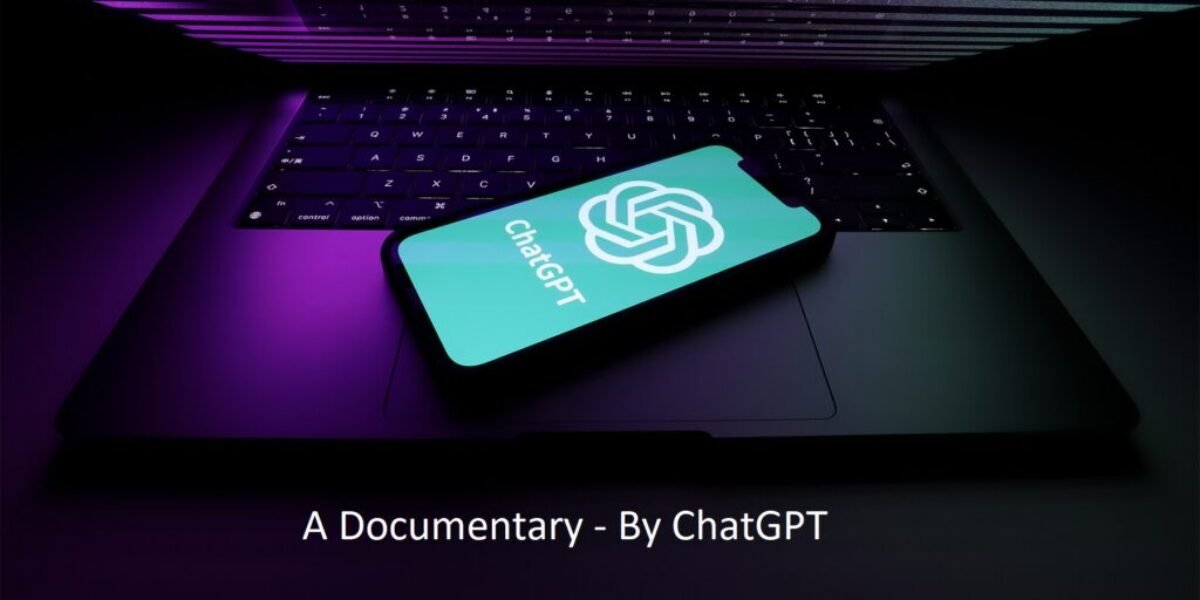A Documentary – By ChatGPT
A Documentary – By ChatGPT
“You have to try it”, my colleague said – enthusiastically shoving his phone in front of me.
After I pranced around a warehouse in a special backpack and frame that gave me super strength to move boxes, we were on our way home. Although a new future had just begun, it had felt unsettlingly futuristic.
OpenAI’s ChatGPT chatbot was operational in November 2022, and anyone could test it if it weren’t already at capacity.
ChatGPT is amazing – the follow-ups it can process, such as “make it less formal”, and “make me sound northern”, are mind-blowing.
-
What is ChatGPT?
The company has a line of AIs it refers to as GPTs, which stands for Generative Pre-Trained Transformer, the most recent of which is ChatGPT. Based on statistical probability, it functions like a supercharged predictive text, putting one word before another. Despite having no real knowledge, it still sounds terrifyingly human and credible.
But if you push yourself further, play harder, and try to make it “steal your job,” you might land with a (comforting) bang.
Recommended: ChatGPT In Data Science – 5 Ways ChatGPT Can Assist Data Scientists
Stirring Debate
A few weeks later, Radio 4 called to ask me to make a documentary on ChatGPT because it might even be helpful. This was at an Ethics in AI event at the University of Oxford (yup, that is what I do in my spare time).
The calls came in from numerous media outlets as the production simmered in the background. It seemed that the era of “it’s to techie/no one understands it/people are afraid of AI/our viewers aren’t interested in technology” had abruptly ended.
The ability to test this sophisticated generative AI had altered the situation. Everyone was in a frenzy as people played with it, academic institutions debated what uses they should permit, and professionals wondered what it meant for them.
As is well known, it frequently hallucinated and got things wrong, but the problem was that it also got things right.
I had the luxury of listening to the world’s top academic analysis and discussing what AI means for us.
This subject matters to me and ought to matter to all of us, so I didn’t want to keep it to myself. And now, the discussion is widely shared. Because something is technologically feasible, we cannot simply let it happen.
The place AI will have in our society, how we will interact with it and one another, how we will address its bias, and how we will direct its decisions must all be discussed, considered, and decided.
Also Read: OpenAI’s ChatGPT – 6 Big Problems With OpenAI’s ChatGPT
Sentient Sense Of Sensibility
The documentary’s production offered a moving target. As soon as we had bagged the visitors and addressed the problems, new situations arose. Some were hypothetical, while others presented problems.
We spoke with experts, people who were embracing it creatively, people who were leery, and some people who were just curious about what it would mean for their careers.
We experimented with writing an introduction, questions, and a conclusion for the program. You can interpret its work however you like, but what seemed impressive at first frequently descended into the absurd.
“Good day, tech enthusiasts…” is not my usual greeting of choice. Perhaps it should be, or perhaps AI is smart enough to know better, and perhaps we are already losing our capacity for sentience.
We have only seen this technology in its initial form. Indeed, it is impressive, representing a significant turning point for AI.
I certainly don’t discount the boundless opportunity and potential that will result. There will also be traps and numerous difficulties that we had never considered.
Whether it is Dall-E generating art, Google’s Bard or any future rivals, this is a time of change, and the systems will only improve.
Also See: ChatGPT Alternatives – 9 Best ChatGPT Alternatives (Free and Paid)
Mistakes And Surprises
I’ve used ChatGPT-powered search as a Bing AI beta tester. “Knowledge is power” has never felt more accurate.
You can actually (virtually) talk when you combine technology that can mimic human speech with factual information. It enabled me to schedule some sightseeing and plan a meal for 17 people.
Although its link selection was unexpected and its advice was not absolute, it seemed sensible and helpful.
Finding a vegan restaurant close to a shooting location the following week may have been as frustrating for it as it was for me. How very human of me to think I was being too picky. Testing it came with the warning that we are learning together, and there may be some mistakes and surprises since it has been known to reflect the spirit of its interrogator, but it did come with that caveat.
The subtleties of human behaviour and the complexity of human thought cannot be accurately replicated by ChatGPT or any of its competitors. They are not humans, and they have never lived. However, they have a lot of options.
Despite my misgivings about it, ChatGPT was occasionally useful in producing the documentary. It could not distinguish between a passing remark and a “this needs to be in,” so I could not bounce ideas off of it or give things some thought. Thank God for Fiona, my incredible human producer. You can judge how well it performed the role of virtual producer. Nevertheless, I don’t believe I will just hang up my BBC lanyard.
A Documentary: By ChatGPT, with Lara Lewington, on Radio 4 and BBC Sounds, 20:00 GMT Monday.
